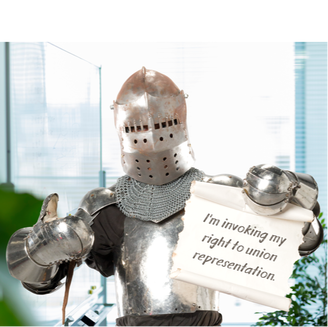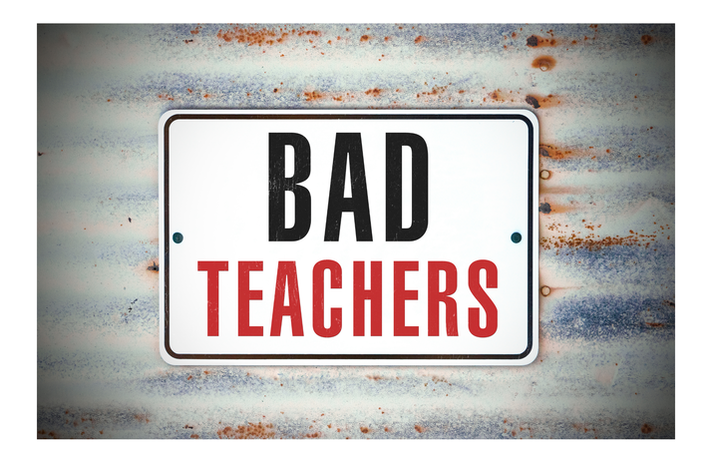|
By L. Spriggs
Unions don’t generally support doing unpaid work for employers because it sets the precedent that employees have an obligation to work for their employer on their time off, and that should be unacceptable to anyone who supports unions. Your employer isn’t entitled to your unpaid personal time. It gets tricky, however, for teachers. One reason is because many people see themselves as working extra for their students, not for their employer, and this leads to them volunteering their time to tutor, to sponsor unpaid clubs, to attend school events, to provide plenty of feedback through grading on their weekends, etc. Volunteering your time for your students outside of the contractually obligated workday is a personal choice that the union leaves up to its members. However, keep in mind that our contract does state that, "As professionals, teachers recognize their obligation to be available often for students and others before and/or after school hours." That's pretty vague, so I interpret that to mean that we should be willing to take or make phone calls when necessary, to occasionally come in early or stay late to meet with parents or students when needed, and to generally make sure we're available at some point for co-workers, students, parents, or administrators if the need arises and the requests are reasonable. The most common concern, especially for new teachers, is whether or not it’s O.K. To roll into the parking lot with just enough time to make it to your desk or office in the morning, or whether it’s O.K. To bust out right at the bell in the afternoon, and how they might be judged by others for doing so. From a union perspective, it’s not your obligation to justify your arrival and departure times for the administration, for parents, or for your fellow co-workers—as long as you’re here when you’re supposed to be and need to be. Some of us arrive early, so we leave early; some of us stay late so we arrive just on time; many of us take work home, have kids to drop off or pick up, appointments to get to, shopping to do, etc. Sometimes you just have a rough day and need to get the hell out of the building as soon as possible, and some of us just like to spend as little time at work as possible just because it’s work. As long as you're fulfilling your duties, there are no extra prizes for coming in early or staying late, and no extra penalties for walking in with the students or leaving with the students. Finally, don’t forget that some of us see teaching as a calling, and some of us see it as just a job, and as long as you’re doing the job well and you’re adhering to the contract, both of those views are equally acceptable from a union’s perspective. There’s already a teacher shortage in America. If we waited around to hire only teachers who felt called to teaching, our class sizes would be a heck of a lot bigger. By L. Spriggs Not really. A grievance can only be filed against your employer. If you're having issues with a co-worker, perhaps dealing with workplace bullying or harassment, for instance, you would need to file a complaint with an administrator first. If the administration fails to address the issue, then you or the union might have cause to file a grievance against the administration if their failure to act can be construed as a violation of the contract or your workplace rights.
Another alternative would be to complain to HR. However, remember that HR works for the interests of the district and the school board, and those interests might not always align with yours, so you might not get the outcome you desire. You might also consider looking into the union's constitution. Most Constitutions and by-laws provide means to remove a member from the ranks if they're conducting themselves in ways that are unbecoming to union membership. Finally, unlike workplace bullying or harassment, sometimes an issue might not be serious enough to involve the administration at all. Don't forget that, especially for less serious issues, you always have the option of asking your department chair or another fellow union member to assist in mediating an issue first. By L. Spriggs Being non-tenured basically means you're on probationary status for the first four years before your full due-process union protections kick in. For your first three years, you can be dismissed for any non-discriminatory reason, and the district need not give you that reason. In your fourth year, however, they must provide their specific reasoning, which makes it easier to challenge a dismissal. For this reason, school districts are actually encouraged to dismiss poorly performing teachers in the first three years instead of waiting, which means if you've made it to the fourth year without any previous evaluative or disciplinary issues then there's a good chance you'll earn tenure.
Furthermore, the school board is required to notify you whether you're being rehired or dismissed the following year at least forty-five days prior to the end of the current school year. Something else that's good to know is that thanks to new rules for tenure under the PERA law, you're tenured after only 3 years if you receive 3 consecutive annual evaluations of "Excellent." Finally, if you ever have any issues or questions within those first four years, never hesitate to contact someone in the union for guidance or advice. You're still a member, after all. We often hear stories of unions protecting the jobs of undeserving teachers. I don’t plan to focus on those outliers too much here or in future newsletters, but I’d like to address it in brief. Unions are required by law to protect all members’ rights. They can’t pick and choose whose rights to protect, and they have no legal say in the hiring and firing process. In fact, even if a union removes a member from its ranks for unprofessional, unethical, or egregious behavior, it’s still legally obligated to represent the employee.
A union offers very little protection against justified discipline or termination as long as management follows the contract and documents and carries out discipline in accordance with the law and due process. Essentially, unions don’t protect "bad" teachers; instead, administrators do when they fail to properly document discipline and follow legally enshrined due process protections, such as providing appropriate feedback and remediation for mistakes. Unions are simply adhering to a legal obligation to advocate for all members. Just Google “Teacher Falsely Accused” and you’ll find evidence that even the best of us can find ourselves on the wrong end of an administrator’s, parent’s, student’s, or even another teacher’s unfair, inaccurate, or patently false accusations. If this happens, you have protection and a union to fight for your rights.
Even if you did something worthy of discipline, you still have rights, and it’s difficult to fire a teacher without just cause. Furthermore, thanks to unions and union advocacy, most issues are required by the contract and state law to be formally documented and remediated before a school board dismisses a tenured teacher. As long as you don't do anything outstandingly bad, you’re likely going to just get a warning and some steps to take to fix the issue. Even if something goes in your personnel file, there are laws to prevent sharing most discipline information with anyone else, including future employers. Finally, even if you do something the administration deems as egregiously bad, but you or the union disagrees—perhaps based on context or mitigating circumstances--the District is required to provide, at minimum, a notice of the charges against you, proof for those charges, and a chance for you to respond to the charges in a hearing before the board of education. For tenured teachers who sometimes stay up late at night worrying about whether what they said or did in class is going to get them fired, it’s most likely not. You might get a stern talking-to, or a warning added to your personnel file, but your job is likely safe.  If this thought crosses your mind when dealing with workplace issues, it's time to contact your union rep. Union members have rights that employees in non-unionized workplaces don't, and one of these rights is to have representation during any meeting with administration that might lead to discipline. It's kind of magical, actually, because you can invoke this privilege right in the middle of a meeting. Say you're called down to speak to an A.P. or the principal about something and you're suddenly ambushed with accusations of inappropriate comments you made in the classroom. If you believe a discussion with an administrator could in any way lead to discipline, you can stop the meeting and request union representation before you agree to continue the discussion. Legally, the administrator has to abide. If they refuse, you can just refuse to say anything further until they do. It's your legal right. Even better, you can't be punished for requesting union representation or refusing to discuss the issue until you have a union representative present. You basically have a union-made suit of armor, and this works for any situation with an administrator where you think you might face discipline. Follow this link for more information about Weingarten Rights. Bonus Material: What if an administrator says I'm not in trouble and they just want to discuss an issue? Go to the meeting and discuss the issue. If at any point they change their mind and potential discipline is suddenly on the menu, it's time to stop the meeting and order a union representative. Basically, if you're tenured and there's not going to be an official discipline report or derogatory statement added to your personnel file, there's not much for the union to do since you're otherwise protected by due process as outlined in our contract and state law. |
Categories
All
Archives
May 2023
Editor:
Proud alumnus, union member, and educator in District #201 since 2006. Contributors
Dr. Hentze is the author of High Finance with Hentze, a monthly blog that provides news about District 201's current financial state. |


 RSS Feed
RSS Feed